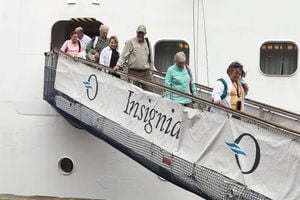Blue economy: The ocean as a solution to climate crisis

Swimmers in Indian ocean.
What you need to know:
- The blue economy offers a multifaceted approach to not only address climate change but also unlock economic opportunities.
The East African region generates over US$10 billion (Sh1.3 trillion) annually in aquatic resources, according to the United Nations Economic Commission for Africa. This figure is predicted to grow significantly through sustainable practices that promote a healthy blue economy.
The blue economy encompasses the sustainable use of all marine and freshwater environments for economic growth, improved livelihoods and jobs while preserving the health of the ecosystem. Activities within this beat range from fisheries and harnessing renewable energy sources like ocean waves and tidal currents to maritime transport, coastal tourism and even extracting marine minerals.
The key to a healthy blue economy lies in conducting activities on vast oceans and seas, lakes, rivers and groundwater in a way that benefits both the economy and the health of aquatic ecosystems. This means prioritising practices that are integrated, fair and circular.
The urgency of adopting a blue economy approach is undeniable, particularly in the face of climate change. Rising sea levels, increasing ocean acidification and warming water temperatures pose significant threats to global aquatic resources. These factors contribute to the degradation of marine ecosystems, disrupt delicate food webs and jeopardise the livelihoods of millions of people who depend on healthy fisheries and coastal tourism.
The blue economy offers a multifaceted approach to not only address climate change but also unlock economic opportunities. Imagine vast offshore wind farms generating clean power or underwater turbines capturing the energy of ocean currents.
Fisheries play a critical role, contributing significantly to the global GDP and food security, particularly in East Africa. Sustainable fisheries management through quotas, responsible fishing gear and marine protected areas ensures healthy fish stocks for future generations.
These healthy fish populations also maintain healthy ecosystems, further aiding climate change mitigation efforts. A thriving fishery not only feeds communities but also holds the delicate balance of marine ecosystems, which act as natural carbon sinks by absorbing atmospheric carbon dioxide.
Large cargo ships burning heavy fuel contribute significantly to air pollution. The blue economy analogy pushes for cleaner technologies and practices such as utilising wind power for auxiliary propulsion on ships or optimising shipping routes for efficiency. Clean oceans prevent methane emissions from accumulating on the seabed.
Since plastic pollution harms marine life and disrupts ecosystems, the blue economy promotes responsible waste management practices. It explores innovative solutions like biodegradable materials or improved waste collection systems in coastal communities.
Oceans play a vital role in regulating the climate by absorbing atmospheric carbon dioxide and storing it as organic matter on the ocean floor. Sustainable practices within the blue economy contribute to the health of these crucial carbon sinks. Healthy marine ecosystems are more efficient at absorbing CO2, helping to mitigate climate change. The blue economy recognises the importance of protecting these natural carbon capture systems.
A thriving tourism industry built on responsible practices protects the very ecosystems that attract tourists. Ecotourism initiatives can educate visitors on the importance of marine conservation and encourage them to become stewards of the environment. Kenya's vast coastline and rich aquatic resources make its blue economy a significant contributor to the region.
The success of the blue economy relies on collaborative efforts across various sectors.
Investing in sustainable aquaculture can help meet the growing demand for seafood while minimising pressure on wild fish stocks. Exploring the potential of blue biotechnology offers opportunities to develop new products from marine resources, further contributing to the blue economy. These advancements can potentially lead to solutions for bioremediation and climate change mitigation efforts.
For example, cultivating seaweed offers a sustainable alternative to traditional protein sources, while research in blue biotechnology could lead to innovations for capturing and storing carbon dioxide from the atmosphere.
Promoting responsible tourism practices that minimise environmental impact ensures the long-term sustainability of this sector, a significant contributor to the blue economy. This includes educating tourists on responsible behaviour, supporting locally-owned eco-lodges and minimizing waste generation in coastal areas.
Investments in oceanographic research, data collection and technological advancements can provide valuable insights for sustainable resource utilisation, ecosystem conservation, and strategies to address climate change impacts. Advancements in areas like remote sensing technology can allow for better monitoring of fish stocks and identification of illegal fishing activities.
The success of the blue economy hinges on collaborative efforts. Capacity-building initiatives for local communities and stakeholders are crucial along with regional cooperation to address shared challenges and maximise opportunities. Governments, regional organisations, the private sector and civil society all have vital roles to play in creating a thriving blue economy.




